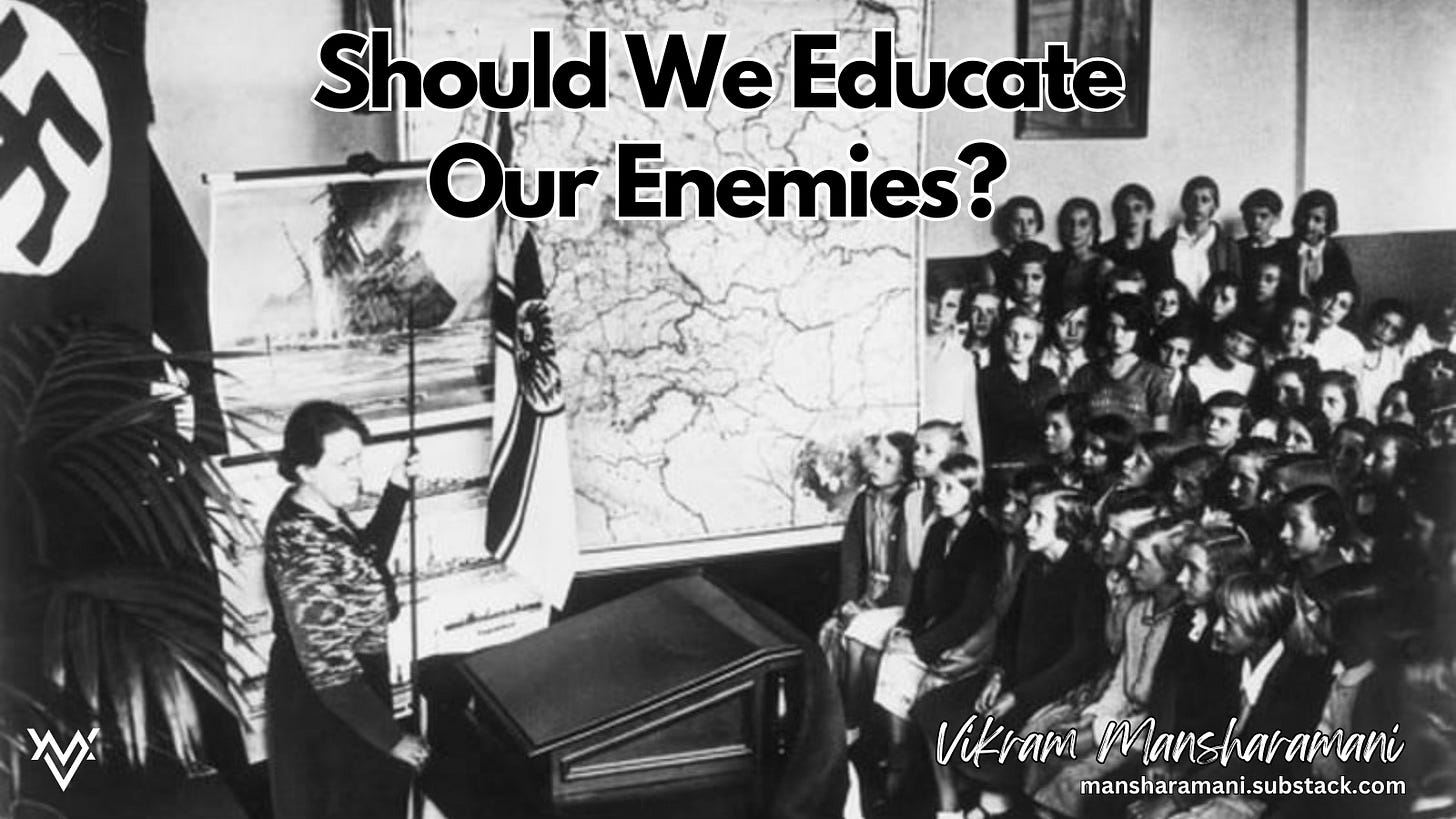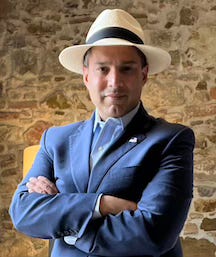Should We Educate Our Enemies?
A simple question to clarify the aims of higher education in the United States
It was a surreal moment…while Harvard’s graduation ceremony was underway last week, the Trump Administration’s effort to ban the school from enrolling international students was making its way through the courts. Alan Garber, the University’s President, took aim at this policy during his opening address when he welcomed graduating students from “around the world, just as it should be.” The assembled crowd cheered at the reference, and speaker after speaker reiterated the sentiment that Harvard should be free to educate the world.
And when news broke that a judge had issued a preliminary injunction against the Trump attempt to ban foreign students, the New York Times reported that celebratory reactions rippled through the crowd.
The effort to ban international students isn’t an isolated incident; the Trump Administration is fighting on several fronts. There are also the investigations into antisemitism on campus, Harvard’s ties to foreign governments, and whether it discriminates based on sex or race. There are also attempts to freeze billions in research funds and government contracts and threats to its tax-exempt status.
But it’s the international student issue that I find the most interesting. Ignoring for a moment the wider culture war that is being waged and looking at this as a standalone issue, it’s worth noting there are powerful arguments to be made both for and against the attempted ban on foreign student enrollment at Harvard.
The obvious argument in favor of international students is based on the global competition for talent. As a business owner who is constantly seeking capable talent, I’m all for growing the pool of available professionals for American businesses. Do we want the world’s best minds and most motivated students going elsewhere? That’s an easy question to answer. Of course we want them coming to the United States, conducting research here, contributing to our knowledge-based economy, even starting businesses. This is especially important when it comes to the STEM workforce in America, where 43 percent of PhDs are foreign-born. Do we really want them studying in and contributing to the development of other countries and economies? As one European friend recently told me, energized by the opportunity, “Fine. You don’t want them? We’ll take them!”
But what about the students who don’t stay and take their learnings and newfound research skills home? There’s certainly nothing wrong with a student wanting to go back home and improve one’s country. That is a worthy and noble undertaking, and over the course of my business and academic careers I have certainly known many who educated themselves with the sole aim of lifting their countrymen up. And there’s something our universities gain by having different perspectives on campus.
But not all of these students are returning home to friendly countries; some are from regions that are not only hostile to the U.S. but antithetical to our entire way of life. Some come from countries that are actively seeking to displace the Western values such as liberty, freedom, and the protection of individual rights. Should we educate our enemies?
To this point, a recent Wall Street Journal article made a stunning revelation: over the course of decades, China has sent thousands of its most promising bureaucrats to U.S. colleges and universities to pursue postgraduate studies. Harvard is a preferred destination; so much so in fact, that the Chinese Communist Party refers to it as their top “party school.” (I remember people thought of Tulane as a top party school!) Graduates often attain senior bureaucratic roles; some have made it to the party’s Politburo. Should America really be educating the leaders of a government that 36 years ago today attacked their own people and today may be conducting a genocide against Muslims within their borders?
Years ago, I had a friendly debate with the chief investment officer of one of America’s largest foundations, a debate that seems eerily relevant today. Knowing that I had studied geopolitics and taught business ethics, he what he believed was a tough question: “What’s the best way to ethically invest in China?”
My answer was simple: “You can’t.”
“That’s not true,” he claimed. “Surely healthcare is not a political issue, shouldn’t we be willing to improve access to drugs or medical care for the ordinary Chinese people? Or what about providing education to the Chinese people?” We went on to have a fruitful conversation about the Chinese people vs. the CCP and the differences between the two groups.
I asked him one question which seemed to crystalize our differences. “Would you have been willing to invest in access to drugs and medical care in Nazi Germany in the mid to late 1930s? Would you have educated Nazi leadership in economics or chemistry?” He didn’t think the analogy between the CCP and Nazis was valid (despite my noting the treatment of Uyghurs), and we ultimately agreed to disagree, conceding that “time will tell.”
So, I’ll ask the question again, this time to a boarder group: Should we be educating our enemies? Please vote in the poll below to see the results.
VIKRAM MANSHARAMANI is an entrepreneur, consultant, scholar, neighbor, husband, father, volunteer, and professional generalist who thinks in multiple-dimensions and looks beyond the short-term. Self-taught to think around corners and connect original dots, he spends his time speaking with global leaders in business, government, academia, and journalism. He’s currently the Chairman and CEO of Goodwell Foods, a manufacturer of private label frozen pizza. LinkedIn has twice listed him as its #1 Top Voice in Money & Finance, and Worth profiled him as one of the 100 Most Powerful People in Global Finance. Vikram earned a PhD From MIT, has taught at Yale and Harvard, and is the author of three books, The Making of a Generalist: An Independent Thinker Finds Unconventional Success in an Uncertain World, Think for Yourself: Restoring Common Sense in an Age of Experts and Artificial Intelligence and Boombustology: Spotting Financial Bubbles Before They Burst. Vikram lives in Lincoln, New Hampshire with his wife and two children, where they can usually be found hiking or skiing.






